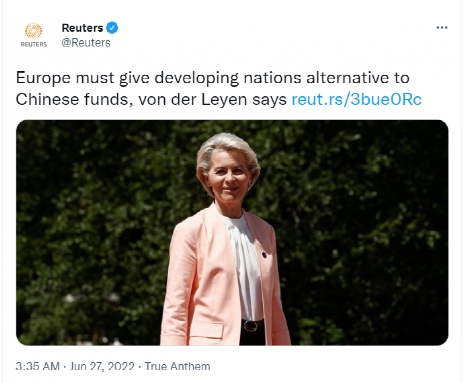
Screenshot from Twitter
European Commission President Ursula von der Leyen's Sunday remarks describing the Europe's five-year plan to mobilizing 300 billion euros to fund infrastructure in the developing countries that seeks to build "alternative to China's funds" has received merciless mockery from netizens from developing countries.
The said Europe plan is "as part of the G7's drive to counter China's multitrillion-dollar Belt and Road project," von der Leyen said, Reuters reported.
"It is up to us to give a positive and powerful investment impulse to the world to show our partners in the developing world that they have a choice and that we intend to step up in solidarity to meet their development needs," von der Leyen said at a news conference alongside the leaders of Germany, Italy, Canada, the US and Japan.
The 300-billion-euro program is part of the US-led Partnership for Global Infrastructure and Investment (PGII), which was launched by the government leaders from Group of Seven nations at their annual gathering to raise $600 billion in private and public funds over the next five years to finance infrastructure in developing countries, media reported.
China welcomes any initiative to promote global construction of infrastructure, Chinese Foreign Ministry Spokesperson Zhao Lijian said on Monday. "We believe that one initiative is not meant to replace another. However, we oppose the act of using the name of infrastructure to promote geopolitical schemes," he said.
The "counter-China" liners in von der Leyen's remarks exposed Western countries' true mentality on international cooperation, triggering floods of mockery online.
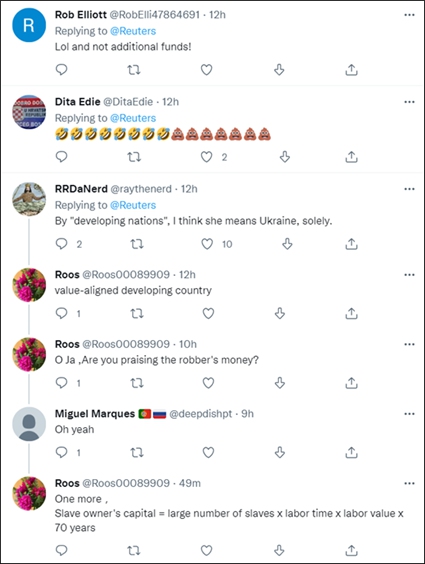
Screenshot from Twitter
Why von der Leyen said the plan is an "alternative" to China's funds, not additional to them? Does she mean that developing countries must take sides between China and the West? And why international aids must fall into such "either/or" pattern? people asked.
Some called the West represented by von der Leyen "robbers" and "slave owners," saying that the money they have come from the West's long-term robbery and exploit in the third world. Therefore, the West's funding should be viewed as only "returning money to the victims of their robbery," which could be counted as atonement with impure motives and is far from actual help.
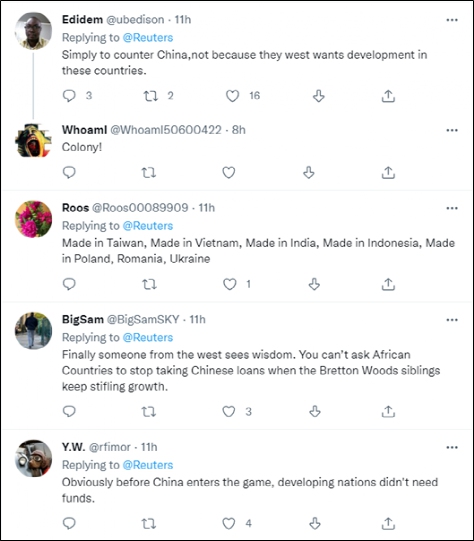
Screenshot from Twitter
"Obviously before China enters the game, developing nations did not need funds," a netizen going by Y.W. mocked on Twitter. Some netizens also mentioned that where was any help from these former colonizers before China began aiding developing countries? Their sudden change is nothing but to serve their agenda of containing China.
Twitter user Petruccio wrote that "Nope. Keep yr money. Colonizers r no longer welcomer."
Hua Chunying, another Chinese Foreign Ministry spokesperson, also tweeted on Tuesday, saying "see the difference" with screenshots attachments of two Reuters reports' headliners, which reads "China willing to work US on Build Back Better World initiative" and "G7 aims to raise $600 billion to counter China's Belt and Road."
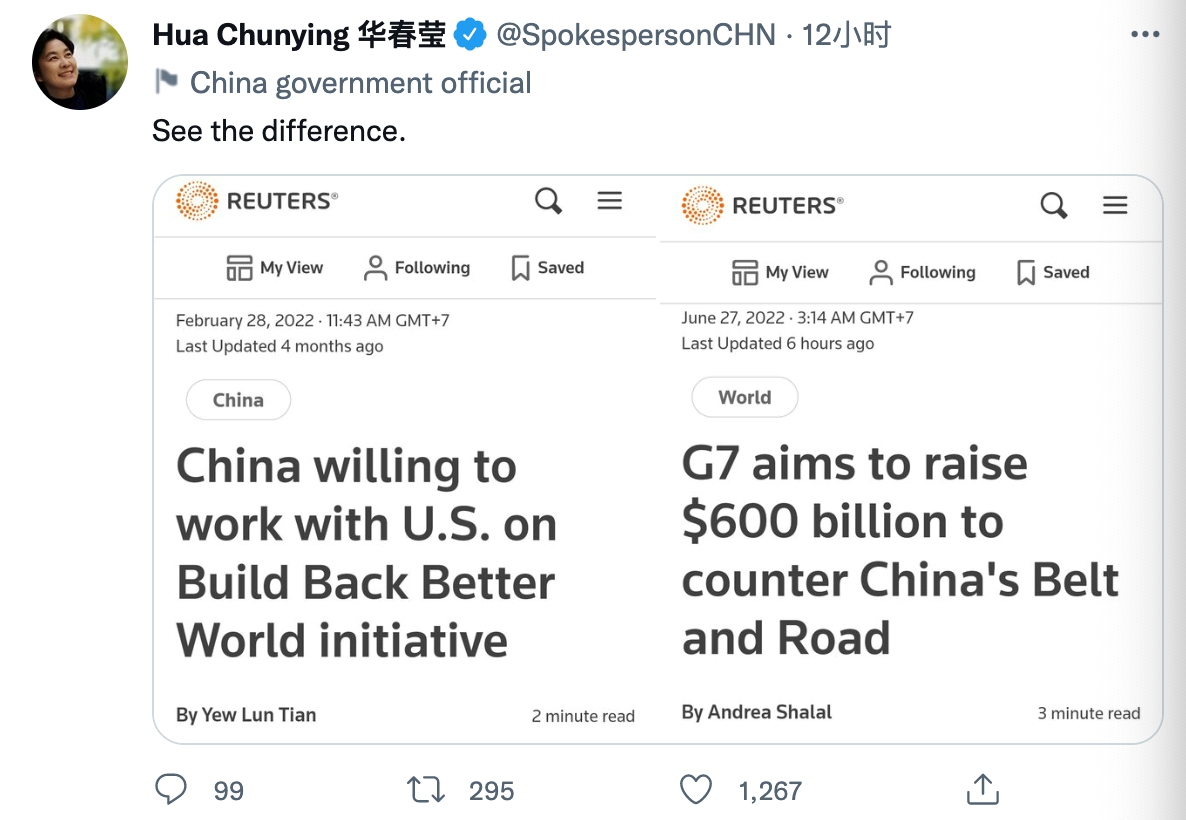
Screenshot from Hua Chunying's Twitter account
In a stark contrast, China's investment and aids to the third world have won netizens' applause and appreciation for they brought concrete solutions to local infrastructure problems.
For instance, under a video post released by Chinse Consul General in Zanizibar, Tanzania Zhang Zhisheng in which local residents gave their hearty applause as Chinese enterprise was helping drill a well for them, netizens left grateful notes.
"Amazing things happening in Africa," wrote one netizen with emoji of loving hearts and Chinese national flags following the comments.
"The priceless happiness, dancing with utter surprise and gratitude, wonderful," wrote another under the post.
While China is delivering similar construction achievements around the world, the viability of US-led $600 billion PGII is questioned right after the announcement for its launch.
The New York Times Chinese channel noed in a Twitter post that as most part of the program is a mixture of public and private capitals rather than direct funding by the government, it is not guaranteed to secure.
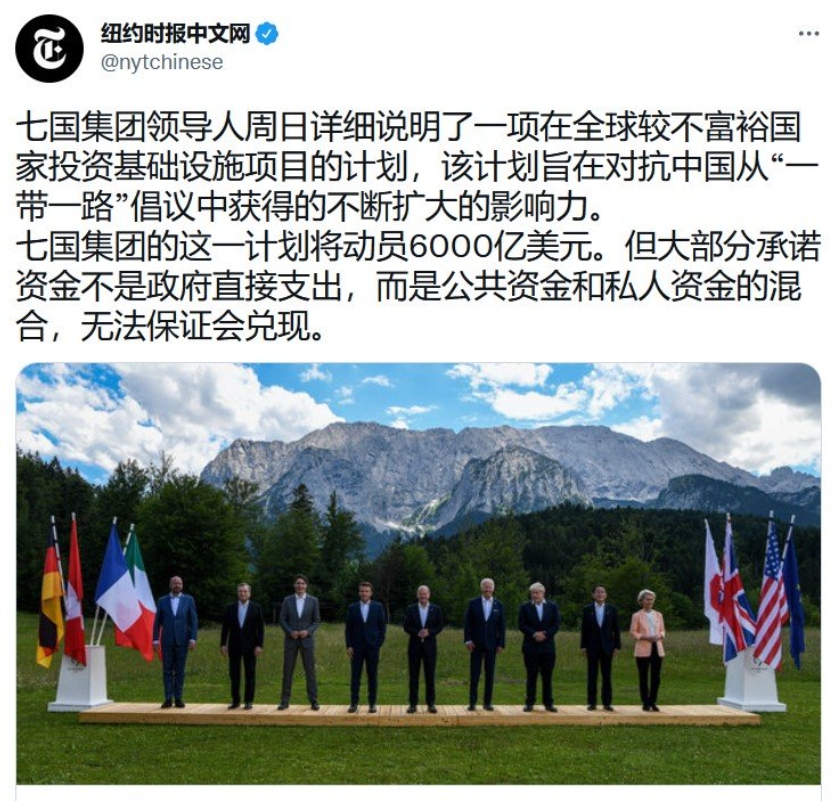
Screenshot from Twitter
And according to the Times of India, the South Asian nation that was quick to join the US-led economic grouping Indo-Pacific Economic Framework, "stopped short endorsing" the PGII.
India's Foreign Secretary Vinay Kwatra said though India will have to see the details of the initiative to be able to speek specifically on it.
The obvious comparison between China's concrete deliveries and "not guaranteed" promises by the G7 has naturally led to netizens' mockery on von der Leyen's remarks.

Screenshot from Twitter
"The new initiative would be another empty promise anyway, Biden and Western leaders might as well call a bigger number of funding. It is really humble for them to stop at only $600 billion," one Sina Weibo user wrote.
"It takes forever for the US to renovate and repair a bridge even within the country, and there is trust of their efficiency of an overseas project," wrote another.
Global Times









